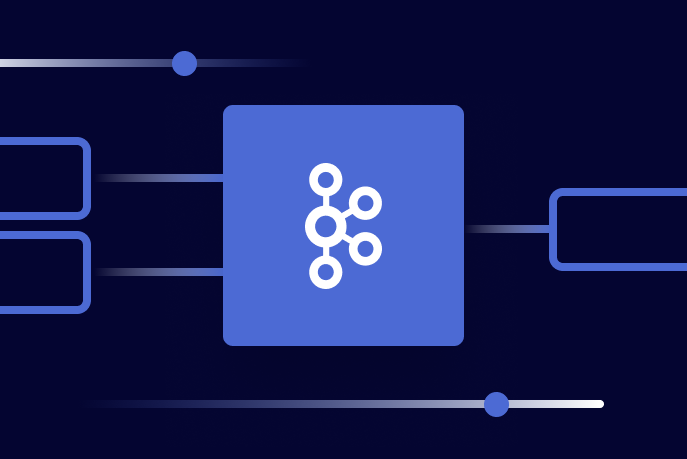[Webinar] Master Apache Kafka Fundamentals with Confluent | Register Here
Apache Kafka
Data Products, Data Contracts, and Change Data Capture
Change data capture is a popular method to connect database tables to data streams, but it comes with drawbacks. The next evolution of the CDC pattern, first-class data products, provide resilient pipelines that support both real-time and batch processing while isolating upstream systems...
Unlock Cost Savings with Freight Clusters–Now in General Availability
Confluent Cloud Freight clusters are now Generally Available on AWS. In this blog, learn how Freight clusters can save you up to 90% at GBps+ scale.
Unleash Real-Time Agentic AI: Introducing Streaming Agents on Confluent Cloud
Build event-driven agents on Apache Flink® with Streaming Agents on Confluent Cloud—fresh context, MCP tool calling, real-time embeddings, and enterprise governance.
How a Tier‑1 Bank Tuned Apache Kafka® for Ultra‑Low‑Latency Trading
A global investment bank and Confluent used Apache Kafka to deliver sub-5ms p99 end-to-end latency with strict durability. Through disciplined architecture, monitoring, and tuning, they scaled from 100k to 1.6M msgs/s (<5KB), preserving order and transparent tail latency.
How to Build a Custom Kafka Connector – A Comprehensive Guide
Learn how to build a custom Kafka connector, which is an essential skill for anyone working with Apache Kafka® in real-time data streaming environments with a wide variety of data sources and sinks.
Why Managing Your Apache Kafka® Schemas Is Costing You More Than You Think
Manual schema management in Apache Kafka® leads to rising costs, compatibility risks, and engineering overhead. See how Confluent lowers your total cost of ownership for Kafka with Schema Registry and more.
Why Cluster Rebalancing Counts More Than You Think in Your Apache Kafka® Costs
Apache Kafka® cluster rebalancing seems routine, but it drives hidden costs in time, resources, and cloud spend. Learn how Confluent helps reduce your Kafka total cost of ownership.
Apache Kafka® Monitoring Is Costing You More Than You Think
Manual Apache Kafka® monitoring and tool sprawl drive hidden costs in time, complexity, and cloud spend. Learn how Confluent lowers total cost of ownership for Kafka with integrated monitoring.
Apache Kafka® Client Updates: KIP-848 (GA), asyncio, OAuth, and More
Explore the latest Confluent client updates, featuring KIP-848 general availability for improved consumer stability and native Asyncio support for Python. We’ve also added simplified OAuth metadata authentication for cloud security and new observability metrics for Node.js consumers.
Connecting the Dots: Simplifying Multi-API Data Flows into Apache Kafka®
This blog introduces the concept of API chaining — a method where data is collected by sequentially calling multiple related APIs. The response from one API is used to construct the request for the next, creating a chain that enables richer, more contextual data collection.
Why Apache Kafka® Migration Costs Are Often Underestimated
Planning an Apache Kafka® migration? Learn how to estimate migration expenses, reduce costs, and compare self-managed vs managed real-time data platforms with expert insight.
The True Cost of Real-Time Data Streaming
Explore the hidden costs of real-time streaming—compare infrastructure, ops, and ROI between Confluent Cloud and self-managed Apache Kafka®. Learn how auto-scaling and governance lower TCO.
Confluent: The Real-Time Backbone for Agentic Systems
Confluent, powered by Kafka, is the real-time backbone for agentic systems built with Google Cloud. It enables agents to access fresh data (MCP) and communicate seamlessly (A2A) via a decoupled architecture. This ensures scalability, resilience, and observability for complex, intelligent workflows.
Leveraging Confluent Cloud Schema Registry with AWS Lambda Event Source Mapping
AWS Lambda's Kafka Event Source Mapping now supports Confluent Schema Registry. This update simplifies building event-driven applications by eliminating the need for custom code to deserialize Avro/Protobuf data. The integration makes it easier and more efficient to leverage Confluent Cloud.
Cross-Cloud Data Replication Over Private Networks With Confluent
Confluent’s Cluster Linking enables fully managed, offset-preserving Kafka replication across clouds. It supports public and private networking, enabling use cases like disaster recovery, data sharing, and analytics across AWS, Azure, Google Cloud, and on-premises clusters.
Monitor Kafka Streams Health Metrics in Confluent Cloud
Confluent Cloud now offers native Kafka Streams health monitoring to simplify troubleshooting. The new UI provides at-a-glance application state, performance ratios to pinpoint bottlenecks (code vs. cluster), and state store metrics.
Scaling Kafka Streams Applications: Strategies for High-Volume Traffic
Learn how to scale Kafka Streams applications to handle massive throughput with partitioning, scaling strategies, tuning, and monitoring.













